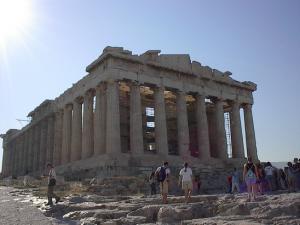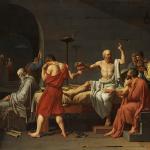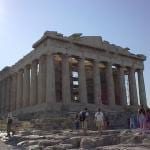 Classical education is education; everything else is a modification of the normal.
Classical education is education; everything else is a modification of the normal.
Almost all American educational methods trace their origins to the splendid combination of Athens and Jerusalem. The result of Greek philosophy and Jewish revelation is the incarnation of education in Christendom: fully human and fully divine.
There is nothing wrong with modifying a workable system, but good to know the nature of the system one is modifying. You cannot fix the operating system if you do not the language of the program. Here are the basic parameters of all real education.
A classical education is Socratic: it begins in questions and ends in wonder. The pattern of education is in the very structure of the Republic and the life of Jesus. First, the upturning of his assumptions will bewilder the student. Second, the student will hypothesize about new solutions to his problems. Third, the student will enter into a community that will produce a “world view” that will allow him to live a good life. Finally, the community discovers a divine story that confirms and broadens what reason has taught.
Jesus lived this educational program and it is summarized in his discussion with His disciples in the gospel according to Saint Luke (24: 13-35). Two disciples were walking to Emmaus after the death of Jesus. They were crushed that Jesus had disappointed their expectations that He was the Messiah. Jesus came to speak to them, the very answer to their felt pain, but hid Himself from them. He wanted to educate them not just placate these men. He bewildered them with questions. They heard his teachings, listened, learned, and finally saw Jesus in communion with Him over a meal.
Socratic education would be called “the road to Emmaus” if we were bolder as believers.
A classical education starts with texts: books, music, film, art, or any human artifact. Education is Socratic, but uses the best of the arts for the material needed for discussion. A good education could begin in any type of text, but it is easier when it begins with excellence.
Beauty is critical to education, because beauty is good. The classically educated student bathes in beauty and so his discussion has hope. The use of beautiful texts allows the dead, those separated from us by the severe divine mercy of death, to speak. If the world was as God made it, then we could ask Eve for wisdom and Noah for truth, but we are isolated in our particular time by death. Texts allow the dead to speak to us without any use of occult powers and break down our chronological loneliness.
We hear Homer in his poetry, argue with him after we learn to love him, and then ask God to help us.
A classical education makes a place for the lecture, but centers on the tutorial. A great lecture is a work of art and so can provoke thought and discussion, but a lecture is for the discussion, not the discussion for the lecture.
Why?
A well-done lecture is a kind of text and it would be a pity to miss this art form. Still, life is short and nobody has time to learn to love every art form. The danger of any class that centers on a particular skill of the teacher is “guru-ism.” Christians have a messiah and His name is Jesus, the Christ. No teacher must take that role. Saint Paul could ask men to do as he did, but only because Saint Paul followed Jesus. Only the Lord Jesus could command that people become as He is.
A classical education stresses the equality of the teacher and the student as human beings, fallen and yet having the divine image. A classical education insists that in a real education there is no teacher except the Rabbi named Jesus.
A classical education values teachers over administrators and professors over programs. If you find Socrates, go study with him. Accreditation is for distributing government funds. Bad education centers on a way of doing things over the people that must be educated. Classical education would abandon any detail on this list if people could be better educated in some other way. Only classical education begins by asking: “What is the good life?” and develops education as a means to achieve that life. Other forms of education assume the goodness of education and then move forward with a methodology.
A classical education produces a virtuous man or fails. The goal of a good education is not facts or the ability to earn money. It is not bad to earn facts or to earn money, but these are not the goal of the human life. The goal of human life is to be happy and being happy depends on being good. Why? Only a good man can see God and only God is worth seeing.
Of course, education cannot make a man fit to see God by itself. We are so broken that only by grace through faith can any student see God. Education is the growth of man saved by grace and mercy. As Jesus grew in grace, wisdom, and in favor with God and men, so the student, born again, grows through the educational process.
If a woman or man is not a lady or a gentleman, then she or he is not educated.
Classical education fails if a reactionary pretends he is being classical. Sadly, some use “classical” as another word for the vain repetition of old ways without their spirit.
If one has Socratic questions without the Spirit, then one is aping education not educating. Education exists for people, not people for education. Classical education exists for the students and the teachers, not for its own sake. Avoid any school that forgets this lesson.
I am honored to serve on a team of classical educators. Every day they urge me to seek wisdom, starting in the fear of the Lord, virtue, and joy.
If you’re in Australia and looking for educational products for your children, you can check out the Target catalogue and Big W catalogue on Catalogue oz.













